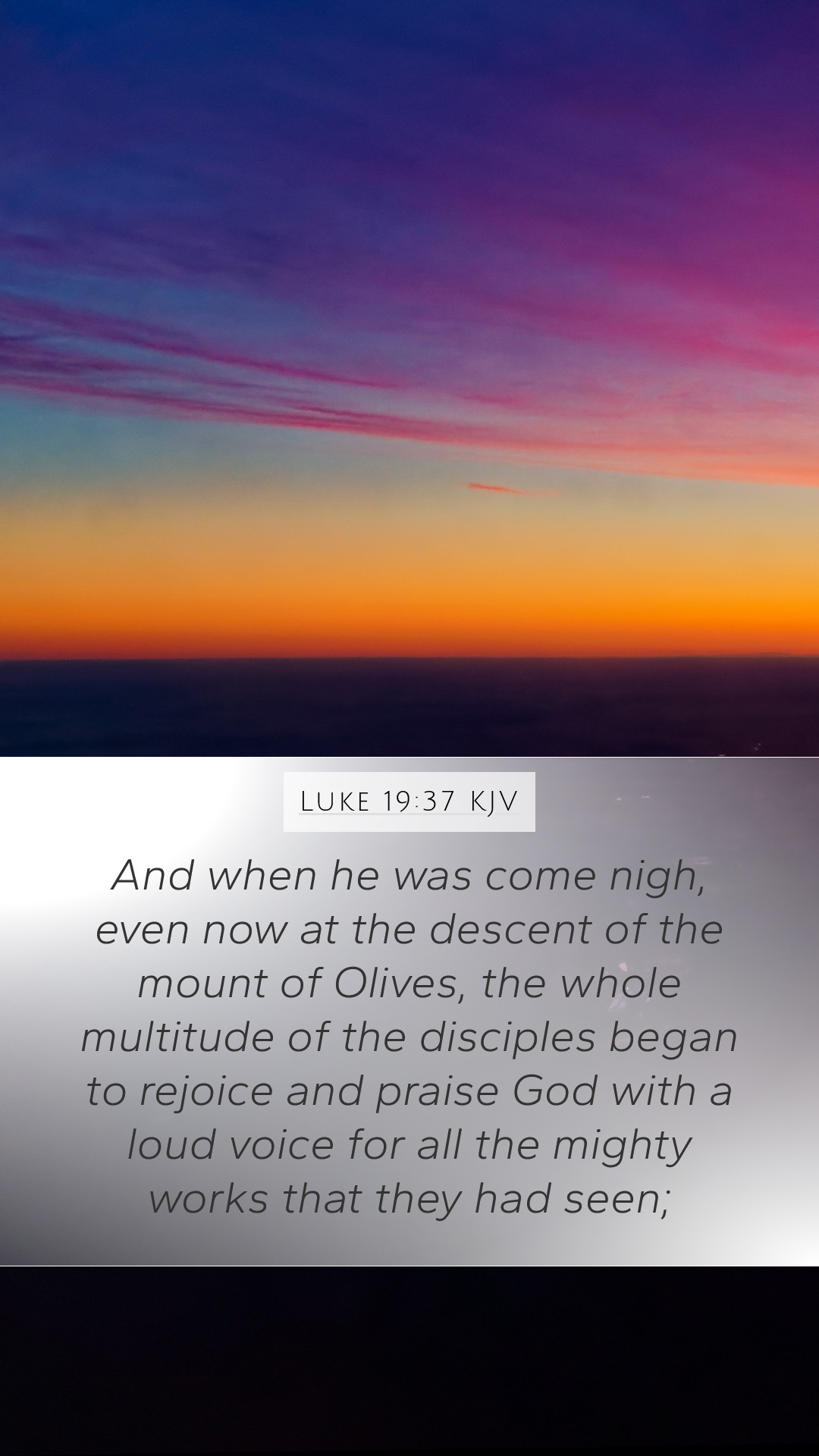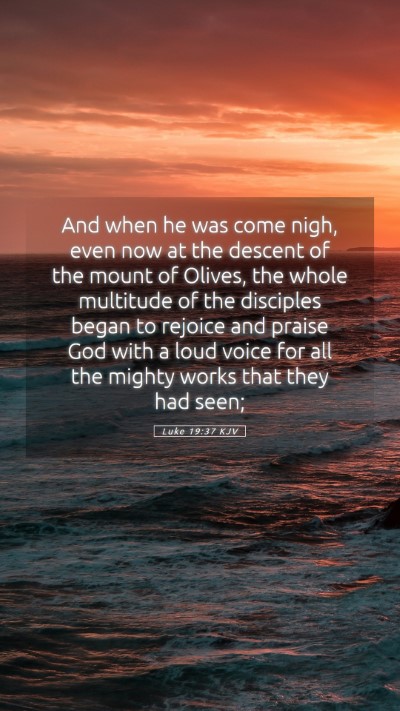Understanding Luke 19:37: A Comprehensive Commentary
The verse in Luke 19:37 states, "And when he was come nigh, even now at the descent of the mount of Olives, the whole multitude of the disciples began to rejoice and praise God with a loud voice for all the mighty works that they had seen." This passage occurs during the event known as the Triumphal Entry, where Jesus approaches Jerusalem, fulfilling Old Testament prophecies about the Messiah. Here, we will explore the meaning of this Bible verse through the insights of noted public domain commentaries, focusing on various aspects such as its historical context, theological significance, and its application in modern life.
Bible Verse Meaning and Its Context
Luke 19:37 is situated in a pivotal moment in the Gospel narrative, marking Jesus' entry into Jerusalem before the events of His passion. It is crucial to understand the crowds that greet Him and the significance of their actions.
- Historical Context: The descent of the Mount of Olives is significant in Jewish tradition and prophecy. It is associated with the coming of the Messiah. Matthew Henry notes that this location connects to Zechariah 14:4, which speaks of the Lord standing on the Mount of Olives in the end times.
- Cultural Significance: The joy expressed by the multitude reflects a cultural response to a royal arrival. Adam Clarke emphasizes that this event symbolizes the recognition of Jesus as the prophesied King, echoing royal welcomes found throughout the Old Testament.
- Theological Insights: According to Albert Barnes, the praise offered by the disciples illuminates the acknowledgment of Jesus' divinity and His miraculous works. Their rejoicing serves as a witness to the power of God manifested through Christ.
Exploring the Joy of the Disciples
The rejoicing of the disciples signifies more than mere excitement; it reveals a profound spiritual understanding of Jesus’ ministry.
- Expression of Faith: The loud voices in praise indicate a strong faith and recognition of who Jesus is. The multitude's actions exemplify the essence of worship and acknowledgment of divine authority.
- Miraculous Works: The disciples praise God for "all the mighty works" they had seen. These works, including healings and miracles, affirm Jesus' power and His role as the Savior. This remains a vital aspect of Biblical exegesis, revealing the direct ties between faith and the acknowledgment of God's glory.
- Community Participation: The use of “whole multitude” emphasizes communal worship, underscoring the importance of body believers praising God together. This can be an important point for Bible study groups, highlighting the communal aspect of worship.
Application of Luke 19:37 Today
The significance of this verse extends beyond its historical moment. It invites modern believers to reflect on their own ways of acknowledging and praising God.
- Personal Worship: Believers today can learn from the spontaneous joy of the disciples. Engaging in worship—whether in private prayer or public settings—should embody joy and gratitude for God's works in our lives.
- Sharing Testimonies: Just as the disciples praised God for mighty works, Christians are encouraged to share their testimonies and experiences of God’s goodness, contributing to a collective filling of faith within their communities.
- Preparation for Easter: This verse serves as a reminder of the significance of Christ’s final week on earth, paving the way for understanding the depth of His sacrifice, making it a relevant scripture analysis leading into the Easter season.
Cross References
Understanding Luke 19:37 is enriched by considering the following scripture cross-references:
- Zechariah 9:9: A prophecy about the King entering Jerusalem.
- Psalms 118:26: A declaration of blessings upon the one who comes in the name of the Lord.
- Matthew 21:9: A parallel account of the Triumphal Entry emphasizing public acclamation.
Conclusion
In conclusion, Luke 19:37 encapsulates a critical moment in the Gospel of Luke, representing the culmination of Jesus’ earthly ministry and the celebration of His identity before His passion. Through this verse, we see key themes of worship, community, and the importance of recognizing God's works in our lives. For anyone engaging in Bible study, this text serves as a rich source of insight regarding the heart of worship and the essence of recognizing Jesus as our King.


